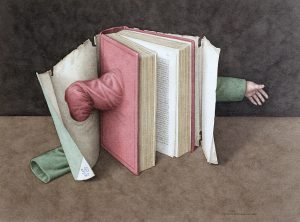A history of the novel, The Oxford History of the Novel in English, Volume 7, asks whether the novel is history. Another,The Value of the Novel, by Peter Boxall provides the theoretical foundation for the argument that the novel is not dead–it has only taken a novel form, one that will forecast cultural change as we emerge, according to the reviewer of these two books, Ben Jeffrey, out of the postmodern phase. It seems though we still need to undergo many more of these phases before we can reach a stageof sufficient maturity that would let us know that ‘modern’ is a bad term because provincial, and ‘postmodern’ because it does not correct the mistake initially made. Yet if the novel is predicted to serve a meteorological function for cultural change, and the intelligent criticism at presentis welcoming it, it would seem likely that things are going to be stormy in the future.

You Cannot Judge a Book… 2004 (w/c on paper) by Wolstenholme, Jonathan (b.1950) ; Private Collection; Portal Painters; English, in copyright PLEASE NOTE: Bridgeman Images represents the copyright holder of this image and can arrange clearance.
Against this windless cultural background, the challenge is to identify what if anything distinguishes the situation of the novel today. In the introduction to the Oxford History (The Life and Death of the Post-War Novel) and the concluding chapter (The Future of the Novel), Boxall and Cheyette identify themselves as part of a critical movement that is seeking to pass beyond postmodernism . . . without simply reverting to the historical models and paradigms that postmodern thinkers were rightly determined to overthrow. Their case for the novel, roughly, is that it remains a singularly powerful medium for forecasting cultural change. Accordingly, it is in the pages of novels, as much as anywhere else, that we are likely to find premonitions of whatever will replace postmodernism.
Sometimes it’s necessary to be boring. What about the truth that we must strengthen the things that remain to save them from becoming remains; what kind of a cultural forecast will the novel envision if it is blissfully unwilling to acknowledge that unlike the weather, the past is in every age needing to be dusted off. Has the novel seriously been reduced to the function of the dogs that are somehow able to anticipate the storm before anyone else? If so, then it certainly would seem that wisdom is moribund–but in this corner, who can purport to predict the weather?
Read the full post at The TLS
